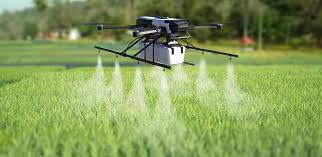
From the dawn of human civilization, it was clear to people that without a way to cultivate food and grow it themselves, there could be no progress. The move from a hunter-gatherer lifestyle to farming and agriculture was a major step towards what we today see as a modern and sustainable way of life, but it was not always so.
Sadly, some regions still suffer despite 21st-century technology making things easier, faster, more optimal, and widespread. In underdeveloped countries and developing economies, only now is there enough progress being made in the agricultural sector thanks to advanced technology like artificial intelligence.
With the help of AI, productivity and efficiency in agriculture can be enhanced and the people doing it, as well as those relying on the yield for sustenance, are far better off because of it. In a country like Zimbabwe that is trying its best to improve and digitalize its nation, the agricultural sector is of extreme importance and it is undergoing a major shift to a more advanced and tech-oriented approach. And the leader through it all is, of course, AI and the tools and gadgets that make use of it. Read on to learn exactly how this modern software is helping Zimbabwe. If you are further interested in modern technology, you can also learn how live casino software solutions are changing the online gambling industry.
Precision Farming and Data-Driven Decisions
The basis of AI-powered agriculture and farming technologies lies in making more informed decisions at the right time. Through satellite imagery, drones, and sensor data, artificial intelligence can analyze soil conditions, monitor crop health, and predict weather patterns which then gives the people a far better idea of how, when, or why to sow or reap. This allows precision farming, i.e. having the right information about when to plant, irrigate, fertilize, and harvest. Certain platforms that are already being used in the south of Africa use AI to detect pests and diseases early and help farmers mitigate losses before they escalate.
Risk Management and Climate Adaptation
Everyone knows that weather conditions are crucial for farming and that without it being right there can be no favorable yields no matter how many modern solutions are being used. Zimbabwean farmers face a wide variety of fluctuating climate variability so AI can help greatly by analyzing historical and real-time climate data to forecast droughts, floods, and other extreme weather events and temperatures. The info helps with better planning and reduces the risks associated with unpredictable weather. Localized weather forecasts and alerts are sent via mobile phones that every smallholder farmer has on them and can therefore react quickly.
Smart Market Access and Pricing Intel
- Mavhunga puts DeMbare into Chibuku quarterfinals
- Masvingo turns down fire tender deal
- Bulls to charge into Zimbabwe gold stocks
- Byo author eyes SA award
Keep Reading
One of the main problems in Zimbabwe’s agriculture has traditionally been the access to fair markets. AI-driven platforms are helping here too since they can bridge the gap between farmers and buyers and offer both sides exactly what they need. Using mobile apps with AI algorithms allows farmers to receive dynamic price updates, market demand analysis, and logistical support, and then grow more of what is needed and less of what is already sufficient. Middlemen exploitation is therefore reduced and better profits for farmers with better prices for consumers is ensured.
Efforts like these truly raise the levels of local economies because there is no need for someone else, which is usually a foreign business or government, to be included and continuously take a high percentage for being an intermediary. However, somewhere where professional help and experience is absolutely necessary is when you want to host online gambling on your platform which is when a provider of API integration for live casino services is the best possible option. Why do it the hard way when integration is there to give you a tailored solution designed specifically for your existing platform?
Zimbabwe’s Agriculture and AI FAQs
What are the main crops grown in Zimbabwe?
Zimbabwe's key crops include maize (a staple), tobacco (a major export), cotton, sugarcane, wheat, sorghum, groundnuts, and horticultural produce like tomatoes and onions. This makes it a very diverse exporter of valuable and sought-after crops.
What challenges does Zimbabwe’s agricultural sector face?
Challenges include erratic rainfall and drought, limited access to financing, outdated farming equipment, land tenure issues, and poor irrigation and storage facilities infrastructure. This is where AI integration can help a lot.
How important is agriculture to Zimbabwe’s economy?
Agriculture contributes between 10 and 15% to GDP and supports over 60% of the population which means it is a vital sector for livelihoods and food security.
What role does smallholder farming play in Zimbabwe?
Smallholder farmers dominate the agricultural sector by producing the bulk of staple crops. However, they often lack access to modern inputs, markets, and technology, which is changing now thanks to modern solutions like AI.
Are there government initiatives to support agriculture?
Yes, programs like Command Agriculture, Pfumvudza/Intwasa (climate-smart farming), and subsidized input schemes aim to boost the productivity and resilience of the sector as a whole.
How can AI improve productivity in agriculture?
AI enables precision farming through data-driven decisions through optimizing irrigation, fertilization, and pest control. This results in higher yields with fewer resources and minimal waste.
What are some common AI tools used in farming?
Tools include drone-based imaging, satellite monitoring, crop disease detection apps, predictive analytics for weather and yields, and autonomous farm machinery.
Can AI help smallholder farmers?
Absolutely it can and it is highly recommended. Mobile AI tools and SMS-based advisory services can provide tailored recommendations on planting, pest management, and market prices, a combination that can empower low-tech farmers.
How does AI support climate resilience in agriculture?
AI models can forecast weather patterns, detect early signs of drought or disease, and recommend adaptive farming techniques to reduce climate risks.
Is AI being used in African agriculture already?
Yes, AI is being deployed across Africa, including in Zimbabwe. Initiatives like AI-powered weather forecasting, market linkages, and smart irrigation systems are gaining traction all over the continent as it has great potential but lacks the means to achieve it.










